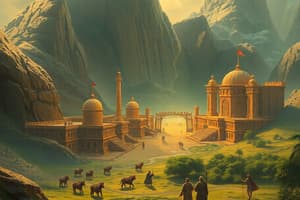Podcast
Questions and Answers
Which historical trade route played a critical role in facilitating economic, cultural, and technological exchanges between East and West?
Which historical trade route played a critical role in facilitating economic, cultural, and technological exchanges between East and West?
- The Spice Route
- The Silk Road (correct)
- The Incense Trail
- The Tea Path
Which notable figure from the Medieval Period is known for his travels to Asia and documenting his adventures in his book?
Which notable figure from the Medieval Period is known for his travels to Asia and documenting his adventures in his book?
- Marco Polo (correct)
- Joan of Arc
- Alexander the Great
- Genghis Khan
Which period in history saw the rise of rational thought, leading to revolutionary movements and industrial advancements?
Which period in history saw the rise of rational thought, leading to revolutionary movements and industrial advancements?
- The Renaissance
- The Baroque Period
- The Enlightenment Era (correct)
- The Industrial Revolution
Who among the following was a key figure responsible for the expansion of Islam during the Medieval Period?
Who among the following was a key figure responsible for the expansion of Islam during the Medieval Period?
Which inventor is credited with the invention of the telephone?
Which inventor is credited with the invention of the telephone?
During which historical event did the Black Death leave a lasting impact on European society?
During which historical event did the Black Death leave a lasting impact on European society?
What key development led to the formation of sedentary communities in early human societies?
What key development led to the formation of sedentary communities in early human societies?
Which ancient civilization developed cuneiform writing around 3500 BC?
Which ancient civilization developed cuneiform writing around 3500 BC?
Who was the leader that expanded his empire from Greece to Asia?
Who was the leader that expanded his empire from Greece to Asia?
Which civilization enlisted thousands of workers to build the colossal pyramid of Giza?
Which civilization enlisted thousands of workers to build the colossal pyramid of Giza?
Which event introduced agriculture and significantly impacted early human societies?
Which event introduced agriculture and significantly impacted early human societies?
Which empire stretched for over 2,500 miles throughout South America?
Which empire stretched for over 2,500 miles throughout South America?
Flashcards are hidden until you start studying
Study Notes
Unraveling World History's Timeless Tapestry
World history is a vast tapestry woven with countless threads spanning millennia across continents. As we delve into this captivating realm of human existence, let's embark upon a journey through time, navigating key moments and civilizations that have shaped our present reality.
Early Human Societies
The primal strands begin with the emergence of hominids and their evolutionary transformation into Homo sapiens around 300,000 years ago. From these humble beginnings came prominent developments such as the Neolithic Revolution, which introduced agriculture and led to the formation of sedentary communities, shaping societies far beyond hunter-gatherer lifestyles.
Civilizational Giants
Civilizations like ancient Egypt, Mesopotamians, Indus Valley, Shang Dynasty Chinese, Classical Greeks, Romans, and Inca Empire all make up the backbone of world history. Their complex social structures, monumental achievements in art, architecture, engineering, philosophy, science, and governance continue to inspire us today. For instance, Sumerians developed cuneiform writing circa 3500 BC; Ramses II enlisted thousands of workers to build the colossal pyramid of Giza; Alexander the Great expanded his empire from Greece to Asia; Rome ruled much of Europe, North Africa, and Western Asia; while the Incan Empire stretched for over 2,500 miles throughout South America.
The Silk Road and Global Interconnectivity
One mustn't forget the critical role played by the Silk Road in laying the groundwork for globalization. Spreading economic, cultural, and technological exchanges between East and West, it facilitated trade of goods such as silk, porcelain, tea, and horses alongside ideas like Buddhism. Through its intricate network of routes, the Silk Road served as both a catalyst and conduit for cross-cultural understanding.
Medieval Period
The Middle Ages were marked by significant events including the Crusades, rise of Christianity, Islamic Golden Age, Mongol invasions, and the Black Death—all of which left indelible imprints on European society. Meanwhile, Asian empires flourished, spawning notable figures such as Genghis Khan and Marco Polo. This period also saw the expansion of Islam, particularly via the Umayyad Caliphate, giving birth to dynamic centers of learning, commerce, and culture.
Enlightenment Era & Modernity
In the 18th century, thinkers embraced rational thought during what became known as the Enlightenment era, sparking revolutionary movements, democratic ideals, and industrial advancements worldwide. By studying history, one may discover remarkable historical characters whose pioneering efforts transformed societal norms forever. These include philosophers such as Immanuel Kant and John Locke, political leaders Thomas Jefferson and James Madison, inventors like Nikola Tesla and Alexander Graham Bell, artists like Leonardo da Vinci and Vincent van Gogh, explorers Christopher Columbus and Amundsen, and entrepreneurs Henry Ford and Martha Matilda Harper.
History continues to evolve amidst contemporary conflicts, scientific revolutions, and profound societal shifts. It serves as a vital tool in nurturing understanding of humanity's past, fostering insightful perspectives towards our shared future. So why not immerse yourself in world history? By peeling away layers of time, you will unearth valuable lessons, celebrate triumphs, mourn losses, and appreciate how far humans have come.
Studying That Suits You
Use AI to generate personalized quizzes and flashcards to suit your learning preferences.




